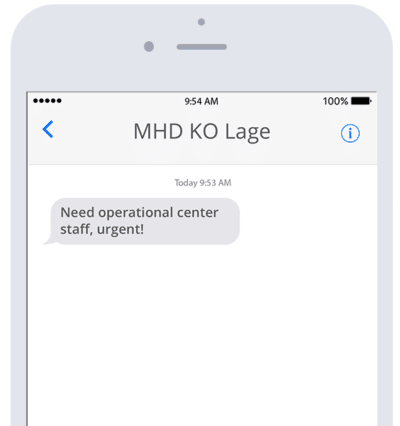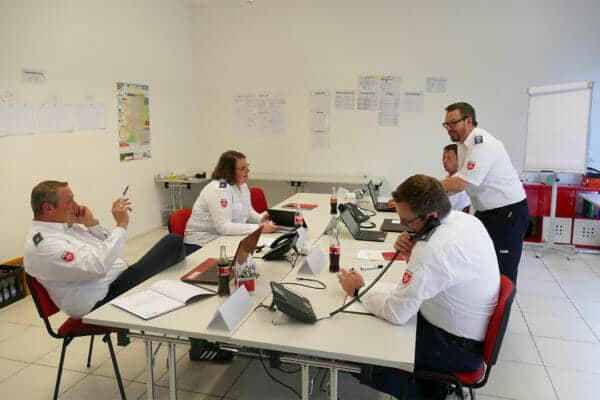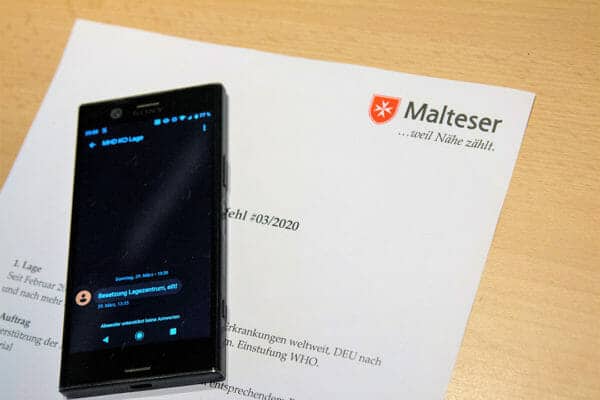At the beginning of the corona crisis, the Malteser Hilfsdienst in Koblenz had to react quickly. The aim was to optimise the internal communication with emergency services and volunteers in case of pandemic missions. Reliable standby communication was sought in order to organize an emergency task force in a timely manner without having to rely on apps or bidirectional communication.
SMS solution saves time in crisis coordination at Malteser Hilfsdienst
The initial situation
The Malteser Hilfsdienst is a Catholic relief organisation and provider of in-patient health and social care facilities, operating nationwide. Since the beginning of the Corona crisis, they have been in a difficult situation that led to an internal restructuring. The organisation needs to be able to react quickly in case of short-term interventions in hospitals, old people’s homes or in disaster control. It also needs to coordinate care assistants efficiently and directly.
Almost everyone has come into contact with Malteser Hilfsdienst at some time or another. They may have offered your last first-aid course or support parents or grandparents with the life-saving “home emergency call”. Also, the ambulance services of the Malteser can be seen everywhere in the townscape. This is no surprise, since with more than 35,000 full-time staff members, Malteser Hilfsdienst is one of the largest German employers in the health and social sector.

Many Malteser Hilfsdienst volunteers in hospitals or nursing homes

Few people know, however, that there are roughly 51,000 volunteers who are involved in work at the Malteser Hilfsdienst every year. In Koblenz, the beautiful historic city on the Rhine and Moselle with almost 114,000 inhabitants, the Malteser Command Staff (a common term from civil protection) consists, depending on the situation, of up to 12 volunteer leaders who are responsible for about 70 volunteers.
At the beginning of the Corona crisis, the management level had to react quickly. Most importantly, they had to optimise internal communication with the emergency services and volunteers in case of pandemic operations. The volunteers have had short training courses as nursing assistants, so that they can be appointed as a reinforcement component for the certified hospital staff.
Thus, the aim was to ensure short-term and reliable communication with the emergency services, both at the level of the emergency services and the responsible managers.
The decision-making process
Florian Thillmann, head of the “Information and Communication Technology” department, is also a volunteer at Malteser Hilfsdienst and is mainly responsible for the technical and IT division. He is also a software developer, so it was only natural that he should take on the urgent communication problem.
First of all, messenger, email and SMS solutions were tested. “It was important to me that the final solution was capable of unidirectional communication. The staff application had to function independently of data networks such as 3G, LTE and WLAN. Also, additional costs due to app installations had to be avoided.
There are different staff positions at the Malteser Hilfswerk, comparable to the fire brigade system. The SMS dispatch by A2P messaging can be coordinated centrally by the respective decision-makers in the operational centre. So in the end, only an SMS solution came into question as a means of information”, Thillmann describes his decision process.
When evaluating different SMS gateway providers, the following options were decisive for Florian Thillmann: reliability, ease of use and price.
Other relevant factors were also significantly taken into account in his considerations. The provider had to be based in Germany, there had to be certain available interfaces and their documentation and the support were also important. The web interface (API) was also to be addressed via a self-developed application in the Koblenz operations center.

“I was looking for a possibility, which would ensure the flow of information from the staff to the emergency services at all times in an acute crisis situation. To achieve this, a fast and reliable network solution had to be found,” says the dedicated software developer.
Solutions and improvements
“I already knew the company seven.io from other projects. I was most convinced by the well documented API, the price, as well as the service and the sensitive behaviour of the company in the crisis situation.” The Kiel startup set up 10,000 SMS free of charge for the following three months to every hospital in the DACH region and all important medical facilities on request. Read our press release to learn more about the campaign.
The application of seven.io was integrated into the deployment management system with the master data by Florian Thillmann. Everything was put into operation with the freely accessible documentation in less than 30 minutes. The newly implemented API now saves a lot of time because several recipients can be reached in a very short time.
What counts apart from the price is the service and delivery quality
“I rely most heavily on the reliability of the delivery of SMS messages. When sending SMS with seven.io we achieve a 100% accessibility of the nursing staff and emergency services. In this case, the SMS solution does not give us a competitive advantage, since it was used in the situation center for emergency services in the context of Covid-19,” Florian Thillmann continues.

The software developer did not want to have to worry about anything after the product was installed: “I preferred a quick and easy solution, unpack, switch on – and go! What I personally still like about writing SMS is that you limit yourself to the essentials and communicate consciously”, smiles Florian Thillann.
“The big advantage of sending SMS is that we are no longer dependent on a data network. The direct messages always arrive! If there is no more data network, we cannot access the WLAN anymore, so in the Corona crisis it became urgently necessary to restructure the administration with the volunteers.”
According to Thillmann, another advantage that could not be ignored was that the volunteers could be reached on every mobile phone. It is not self-evident that everybody owns a smartphone nowadays.
Conclusion
Florian Thillmann would like to continue to use the SMS service of seven.io beyond the three-month free offer for the Malteser Hilfsdienst. In his considerations he had also previously considered a longer-term solution, so the price after the expiry of the free Corona offer already played a role. The programmer knew seven.io from other projects and had dealt with the products of the SMS gateway provider in advance. The free offer probably gave him the last jolt to decide, but he was already convinced of the product quality and performance of the startup from Kiel.
“I didn’t want to take any risks, I already had experience with seven.io and the finished software page also convinced me – the whole package was just right! We will continue to use the free offer. After a few weeks the new solution is already noticeable, the volunteers are much faster and easier to reach. before we used the SMS solution, we had to reach out to each individual person by email or SMS. This would have cost us a lot of unnecessary time in the current crisis situation.”
Best regards
Source of header picture: iStock.com/ollo